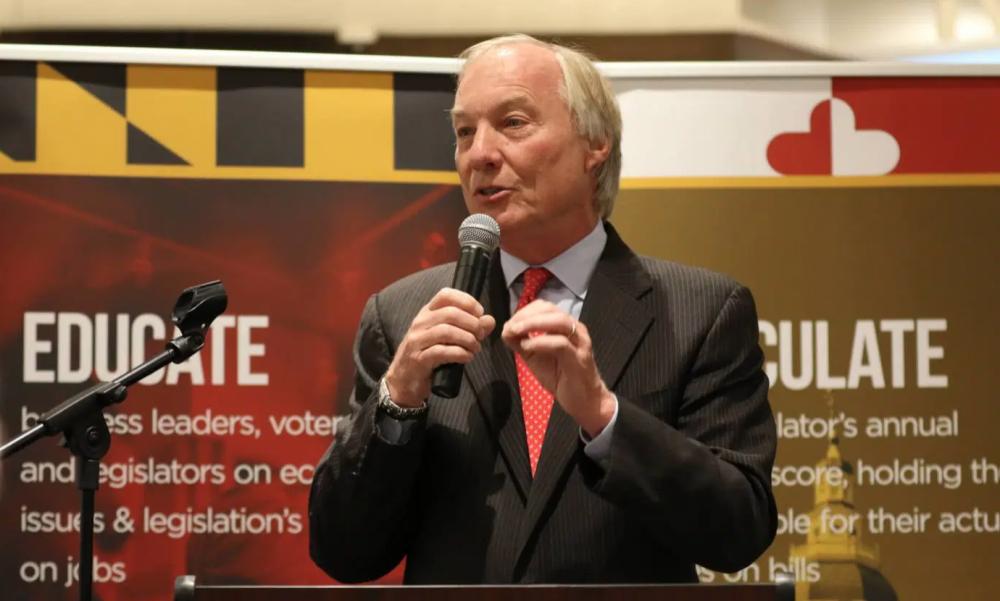Maryland’s chief tax collector implored state lawmakers to delay action on revenue measures, saying that a looming recession — or worse — make this a dangerous time to add to the tax burden businesses and consumers face.
In an interview on Friday, Comptroller Peter V.R. Franchot (D) warned that Maryland faces not just a recession “but a possible depression” due to the spread of COVID-19. The expected downturn in economic activity triggered by the disease could take a 20% bite out of revenues this year, he predicted.
“This is precisely the wrong time to be imposing higher taxes on the state of Maryland’s business and/or individuals,” he said. “I can’t emphasize that enough.”
Franchot has sided with Gov. Lawrence J. Hogan Jr. (R) in opposing the Blueprint for Maryland’s Future, the bill that would advance the recommendations of the Kirwan Commission, a panel that spent years crafting ways to improve the state’s K-12 education system. In that respect, his opposition to Kirwan-related tax hikes is not particularly noteworthy. Hogan’s political Twitter accounts on Friday linked to articles containing Franchot’s recent warnings about taxes — a reminder of how frequently the governor’s and comptroller’s agendas are aligned.
But Franchot’s appeal to lawmakers appeared to go beyond earlier statements of opposition.
“Take a time out,” said Franchot, an already-announced candidate for governor in 2022. “Wait for a special session, or whatever, six months from now. Don’t pull the trigger right now. The world has changed in the last few days.”
University of Maryland economist Peter Morici said the severity of the drop in economic activity will depend on how long the virus lingers — and that two quarters of low or depressed economic growth is likely.
“I think his number of 20% is probably a responsible number, and just the mere delaying of revenues means the state has to borrow more,” said Morici. “We’re looking at a period of extended austerity, at least for this year and maybe into next, or this year into 2022. But I think his comments are very responsible given the uncertainty of this thing.”
Morici, who teaches economics at the University of Maryland’s Smith School of Business, called this “a very imprudent time to raise taxes.”
In the wake of Franchot’s warning and the uncertainty surrounding the COVID-19 outbreak, Kirwan backers signaled on Friday that they recognize the need to maintain flexibility in financing their education reform efforts.
“We’re having those conversations right now,” House Majority Leader Eric G. Luedtke (D-Montgomery) said. “A number of the revenue bills we’ve passed have delayed effective dates. They wouldn’t be effective until 2021.”
House Economic Matters Committee Chairman Dereck E. Davis (D-Prince George’s), whose jurisdiction stands to reap significant benefits from Kirwan, said the General Assembly isn’t “going to do anything reckless.”
“Speaker [Adrienne A.] Jones and [Appropriations Committee] Chairwoman [Maggie] McIntosh… are thinking about the same things that the comptroller is thinking about. This is, we trust, a temporary situation. Things are going to bounce back as soon as we can get through this crisis. Things will return to normal. And we can make minor adjustments in some of the timetables.”
Sean Johnson, the state teachers’ union’s chief legislative strategist, said financing Kirwan reforms “was always going to require a delicate balance and a multi-year approach.”
“Ultimately the most important thing for this session is for the Blueprint and a new funding formula to pass so our students get the support that they deserve,” he added.
On Thursday the state’s Board of Revenue Estimates chose not to update prior budget estimates for the current and next fiscal year, citing economic uncertainty due to the global pandemic.
To give business-owners time to grapple with the outbreak, the comptroller’s office has extended certain business tax filing deadlines until June 1. Franchot said he will also delay the April 15 tax-filing deadline for individuals an unspecified period, either in tandem with the IRS or, if necessary, on his own.
For the state’s treasury, that sets up a one-two punch — delayed revenues and lower-than-projected revenues.
“I’m in touch with businesses all around the state,” Franchot said. “They’re already saying the supply chain is getting choked off and they’re very concerned about being able to… survive this.”
“We’re waking up every day and the world has changed.”
By Bruce DePuyt


